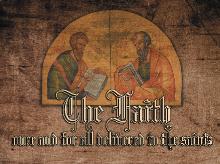 |
|
HOME | PROCLAMATION! MAGAZINE | DEVOTIONALS | STUDIES | LETTERS | ABOUT US | RELATED WEBSITES |
|
HOME / PROCLAMATION MAGAZINE / 2007 / NOVEMBER/DECEMBER / LANGER
NOVEMBER / DECEMBER 2007
VOLUME 8, ISSUE 6
A R T I C L E S
The Faith once and for all delivered to the saints
Rick Langer
Introduction
There is nothing new under the sun—so said Solomon almost 3000 years ago. In few areas is this more true than in area of false teaching. False teachings seem to be almost endlessly recycled. The changes are so minor that they serve only as faint distinguishing marks that ultimately confirm Solomon's pessimism regarding innovation. False teachers also bear striking similarity to one another, practicing with minor variation an all-too-familiar theme of intellectual and moral license.
The good news, of course, is that the thoughtful student of Scripture and church history is well equipped to discern false teaching because it is almost never new. An eye to the past—both in Scripture and history—guides one remarkably well in the present. In what follows, I will take a quick look at a biblical example of discerning the error of false teaching. It comes from the book of Jude, and its ancient wisdom remains very instructive to us today.
Jude 3-4
The author of the book of Jude writes:
Beloved, although I was very eager to write to you about our common salvation, I found it necessary to write appealing to you to contend for the faith that was once for all delivered to the saints. For certain people have crept in unnoticed who long ago were designated for this condemnation, ungodly people, who pervert the grace of our God into sensuality and deny our only Master and Lord, Jesus Christ. (ESV)
This passage contains a sort of mission statement regarding doctrinal orthodoxy as well as two practical guidelines for pursuing that mission. Let us consider each of these in turn.
The mission of orthodox belief
Regarding the "mission statement", Jude writes that we are to "contend for the faith once for all delivered to the saints." Our mission, it would seem, attaches to "a faith" that has been delivered to the saints. It is not the product of the community of faith; it is a gift to the community of faith. We are the recipients and guardians of this faith; we are not its inventors. We have received a gift by the grace of God, and we are to pass it on to others as a gracious gift.
This faith was delivered "once for all". Apparently Jude viewed this faith as having been delivered to the church by the original apostles. The idea that sits behind Jude's thought is not unlike what Paul says when he states that no foundation can be laid other than the one that has been laid (1Cor 3:11). This is not meant by Paul, and presumably not meant here by Jude, to mean that there is to be no further reflection or learning about "the faith." Although "the faith" is something that is finished, final, complete and delivered once-for-all to the Church, as members of the Church our understanding of it is progressive. Indeed, Paul portrays himself as engaged in a building process—adding to the work of God by the ministry he carried out. The point, rather, is that no other foundation can be laid. Additional building must be done upon that one and only foundation that has already been laid—by the work of the person of Christ as delivered in the proclamation of the apostles of Christ. Any message that proclaims a new foundation, or even a message that pretends to lay an adjacent foundation, must be rejected. The foundation has been laid once for all.
Surely one implication must be a suspicion of new teaching, new revelation, and new Scripture. Especially suspect is revelation that displaces the original message, either by supplanting explicitly or by arguing that the original message has been hopelessly muddled and can only be rendered authoritative by a cleansing and purifying process. This process is generally accomplished by the "new revelation." The claim is, in effect, that the faith was once delivered, was then lost, and is now being delivered again by the cleansing wisdom of the new prophet. Notice when this happens, one is effectively claiming that the faith may once have been delivered to the saints, but not "once for all".
A broader examination of the New Testament is a helpful cautionary at this point. It is clear as we read more broadly that a faith once for all delivered to the saints does not eliminate all controversy. There is still room in this faith for the saints who jointly possess it to disagree among themselves on specific points of application. Indeed, Paul cautions strongly against dividing the unity of the body of Christ because of things like what we drink, or what we eat, or when and how we worship. A distinction must be made between the theological core which must be preserved and the diversity of expression of this core in matters of conscience and practice. The mission is clearly to purify the church of heresy not to purify the church of diversity.
Jude also gives two guidelines for identifying heresy which must be purified. Though his theological rule of thumbs for orthodoxy is brief and general, they have proven to be remarkably enduring and relevant all the way down to the modern day.
His signs of departure from the faith come in two distinctly different categories: moral departures and theological departures.
The moral signs of departure
In Jude, the moral indicator that one has departed from the faith "once for all delivered" is the perversion of grace into moral license or "sensuality". The false teachers are marked by moral failure. They have engaged in sensuality which Jude feels can be appropriately likened to the sin of Sodom and Gomorrah (Jude 7). He is not necessarily implying homosexual sin, but rather unrestrained and unrepentant rebellion. There was an unwillingness to limit their desires by moral restraint or respect for any external authority.
Reading more broadly in the New Testament will reveal that there is a second and equally pernicious moral failure which is characteristic of those who have departed from the faith once for all delivered to the saints: moral legalism. This legalism is a constant tension between Jesus and the Pharisees in the Gospels. It does not matter if the issue is how to keep the Sabbath, how to wash one's hands, or with whom one should eat. It is clear that Jesus reserves His harshest words of condemnation for the legalism of Pharisees. This tension becomes even clearer in the Epistles. Paul is outraged that the Galatians have returned to a Jewish legalism that he deems to be equivalent to departing from the Gospel. In Galatians, Paul wishes the legalistic circumcision party would "mutilate themselves." In Colossians, Romans, and Corinthians Paul gives strong cautions against legalistic judgments regarding what people are eating, the holiness of one day versus another, and celebrating festivals. Such legalism is as much a perversion of God's grace as is moral license, and it is equally imperiling to a person's soul.
The theological signs of departure
Regarding the theological departure, Jude observes that the false teachers are denying "Jesus Christ, our only Master and Lord." Though we do not know the exact nature of the denial, it would be safe to assume it entailed denying the deity of Christ since he uses the somewhat unusual phrase Master and Lord. Such a denial is used elsewhere in the New Testament to identify heretical departure from the faith (1 Cor 12:3). This theological departure is probably the root of the moral departure from the faith. Because they have denied Jesus His role as Lord, they do not feel compelled to obey His moral teaching. The theological error plows the field and allows the moral error to grow.
Once more, a broader reading of the New Testament would indicate that other equally problematic errors are possible—specifically, the denial of the humanity of Christ. In 1 John 4, John exhorts his readers to test to see whether spirits are from God. What are the marks of an authentic spirit? A spirit that is from God affirms that Jesus Christ is come in the flesh (1 Jn 4:2). On the other hand, those who deny this truth are not from God (1 Jn 4:3). Heretical theology departs from orthodox theology in either of two ways: by denying the deity of Christ or by denying the humanity of Christ. This notion was firmly entrenched in the mind of early Christians by the closing of the canon—long before it was formally expressed by phrases like "fully God and fully man".
In this short passage, Jude gives a remarkably insightful and durable test for orthodox Christian belief. Though much more could be said, and though there have certainly been other sorts of departures from the faith, this is a great starting point for evaluating the authenticity of a denomination, church, or teacher. Testing the teaching is a mission that is as important today as it was 2000 years ago! †
![]()
Copyright 2008 Life Assurance Ministries, Inc., Glendale, Arizona, USA. All rights reserved. Revised September 24, 2008. Contact email: proclamation@gmail.com

This article is part of a presentation Rick Langer gave at the 2007 Former Adventist Fellowship weekend at Trinity Church in Redlands, California. In it he shows from the book of Jude that the gospel was entrusted to the church once for all, and as the body of Christ, Christians have the obligation to guard and share this pure gospel. We present this article as a foundation for the following two articles by McGregor Wright and Dale Ratzlaff on Colossians 2 and Galatians 2 respectively. We disobey the Lord Jesus and oppose Scripture when we do not understand and teach the truth about the gospel as it was handed down to us once for all through the life of Jesus and the words of the apostles.
 Rick Langer is an Associate Professor in the Biblical Studies and Theology Department at Biola University. Prior to coming to Biola, he served for over twenty years as a pastor at Trinity Evangelical Free Church in Redlands, California. Rick holds an undergraduate degree in chemistry from Colorado State University, and MDiv from Talbot Seminary, and an MA and a PhD in Philosophy from UC Riverside. He and his wife Shari live in Redlands; they have two children: Crystal, 20, and Mark, 18.
Rick Langer is an Associate Professor in the Biblical Studies and Theology Department at Biola University. Prior to coming to Biola, he served for over twenty years as a pastor at Trinity Evangelical Free Church in Redlands, California. Rick holds an undergraduate degree in chemistry from Colorado State University, and MDiv from Talbot Seminary, and an MA and a PhD in Philosophy from UC Riverside. He and his wife Shari live in Redlands; they have two children: Crystal, 20, and Mark, 18.